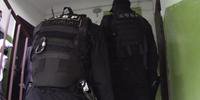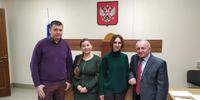The Case of Godunov and Others in Tula
Filter
- #
The Investigative Department of the FSB Directorate for the Tula Region initiates criminal cases against Gurami Labadze, Angela Putivskaya, Yulia Popkova and Yevgeniy Godunov.
- #
Putivskaya and Popkova were detained. They are charged under Part 1 of Article 282.2 of the Criminal Code of the Russian Federation (organization of extremist activities).
The cases of Labadze, Godunov and Putivskaya are combined into one proceeding.
- #
The Central District Court of Tula decides to detain Putivskaya and Popkova. They are placed in Tula pre-trial detention center No. 1.
Yevgeny Godunov was also detained and charged with committing a crime under Part 1 of Article 282.2 of the Criminal Code of the Russian Federation (organizing the activities of an extremist organization).
- #
The Central District Court of Tula issues a decision on the detention of Yevgeny Godunov.
- #
A court hearing to review the measure of restraint. For Gurami Labadze, the court extends house arrest until July 25, 2021. He is allowed to walk for 2 hours. Anzhela Putivskaya and Yevgeny Godunov were released from the pre-trial detention center under house arrest until the same date. The court also imposes a measure of restraint on Yulia Popkova in the form of house arrest, but for an indefinite period. The believer is forbidden to leave her place of residence for 24 hours without the permission of the investigator.
- #
Senior investigator of the investigation department of the FSB in the Tula region, Captain of Justice Alexei Yartsev replaces Putivskaya, Popkova and Godunov with a written undertaking not to leave and proper behavior. The believers spent 2 months under house arrest.
- #
The case of Popkova is combined into one proceeding with the case of Labadze, Putivskaya and Godunov.
- #
The case is submitted to the Proletarsky District Court of Tula. It is appointed to Judge Nina Panarina.
- #
The hearings on the merits begin. Public defenders are appointed to believers. The prosecutor reads out the indictment. The defendants plead not guilty and speak with an attitude to the charges.
The judge reports on the interrogation of the prosecution witness - law enforcement officer A. G. Antoshin. Since this witness was not declared earlier, the defense is motioning to postpone the interrogation of Antoshin. The court grants the request.
- #
11 listeners are allowed into the courtroom, although many more people came to the courthouse to support the defendants.
The prosecution witnesses, employees of the Center "E", are being questioned. They give testimony that does not correspond to that recorded in the case file. Witnesses answer the defendants' questions evasively.
- #
The questioning of prosecution witnesses who attended worship meetings of Jehovah's Witnesses prior to 2017 continues.
One of them claims that the faith of Jehovah's Witnesses is extremist because they are convinced of its truth. He also adds that the defendants posted anonymous letters in mailboxes, although there is no mention of this fact in the case file. The defense objected, calling this accusation false.
Another witness, A. G. Antoshin, states that the defendants "discussed extremist books" during the services. When asked by the defense how he defined it, he answers: "Somehow I understood."
- #
Two witnesses are being questioned. One of them, an FSB officer, when asked by the defense whether the defendants called for incitement to hatred and whether they distributed banned literature, answers: "We were simply guided by the fact that they are Jehovah's Witnesses."
The second witness says that no one urged him to join an extremist organization and did not apply for material assistance. - #
Three secret witnesses are being interrogated - Olshevsky, Panin and Lisov.
- #
The prosecutor reads out the protocols of searches, transcripts of telephone conversations and religious services. They discuss what the Bible says about marriage and money, as well as the repression of Jehovah's Witnesses in the USSR.
- #
Interrogation of two secret witnesses.
- #
Interrogation of expert Irina Salnikova, who, on the instructions of the FSB, performed a linguistic analysis of several case materials. The defense asks questions in order to establish the scientific nature of the examination and draw attention to the conclusions that the defendants consider erroneous. Salnikova gives vague answers and refers to a memo developed by the FSB, which is not publicly available. Lawyers ask to familiarize themselves with it, but the judge rejects the petition.
The court removes most of the defense questions, among them: does the expert have scientific publications on the denomination of Jehovah's Witnesses? Does she know what the defendants are accused of? Is she familiar with the Supreme Court's decision in the case of the liquidation of Jehovah's Witnesses' legal entities?
- #
The court proceeds to the questioning of other experts. The prosecutor and the judge once again prevent the defense from asking questions.
In the conclusion, made by Elena Melezhko, it is indicated that the use of the name Jehovah is characteristic of the Administrative Center of Jehovah's Witnesses in Russia. The defense points out that even Leo Tolstoy used this name in his writings, which the expert is surprised at.
The defense also asks whether the experts are sure that the defendants quoted from publications recognized as extremist. They answer that they could not verify it. They add that the search for these phrases on the Internet led to blocked resources, and this, in their opinion, means that the materials are extremist.
- #
The prosecutor requests 6 years of suspended sentence for Gurami Labadze and Yevgeniy Godunov, 2 years and 6 months suspended sentence for Yulia Popkova and Angela Putivskaya.
Believers deliver the last word.
The last word of the defendant Angela Putivskaya in Tula The last word of the defendant Gurami Labadze in Tula The last word of the defendant Yevgeny Godunov in Tula The last word of the defendant Yulia Popkova in Tula - #

